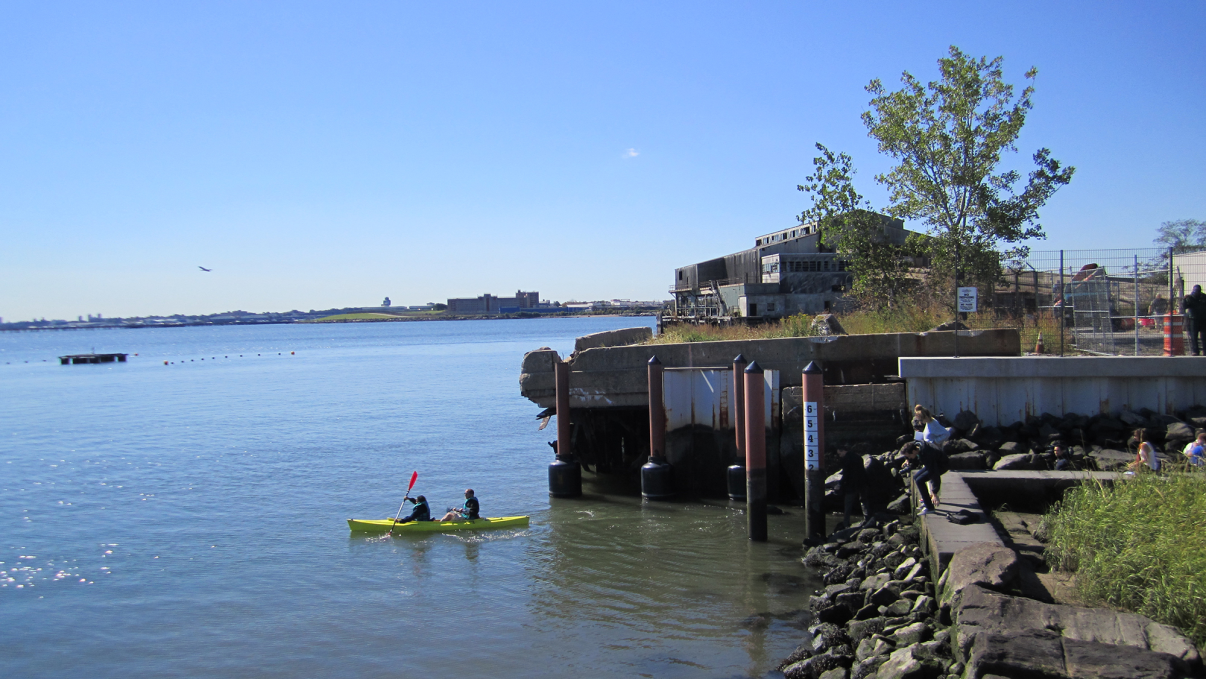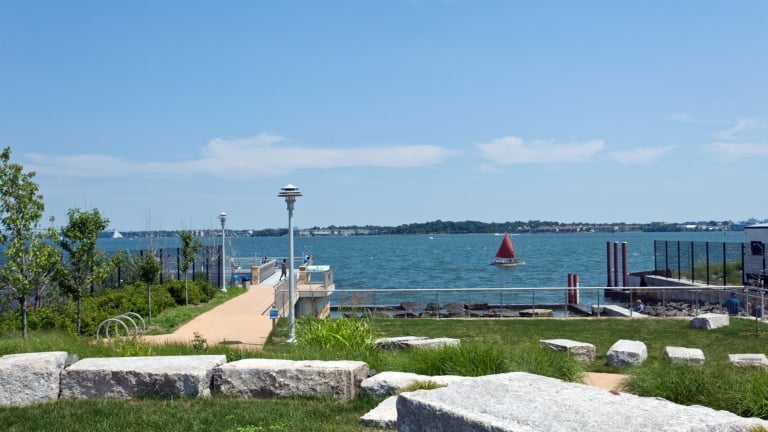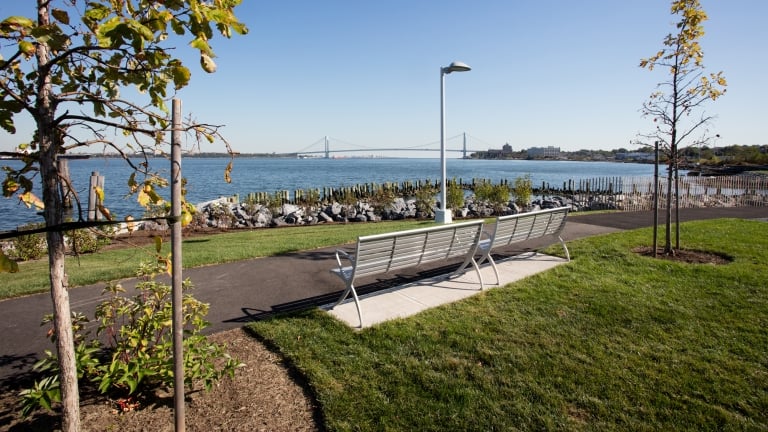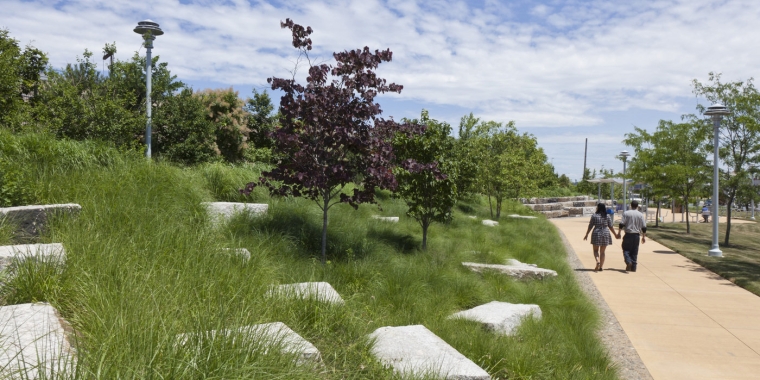
Hunts Point Resiliency
Working with the Hunts Point community to advance resiliency on the peninsula.
Our work toward a more resilient Hunts Point is a community-led effort, guided by the Hunts Point Resiliency Advisory Working Group (AWG), convened by NYCEDC and the Mayor's Office of Resiliency (MOR).
Formed through years of study, planning, and extensive community engagement, The City’s Hunts Point Energy Resiliency Project aims to address the vulnerability of critical industrial and community facilities by providing reliable, dispatchable, and sustainable power to Hunts Point through a combination of energy generation and storage solutions. We plan to achieve this by implementing:
- A tri-generation microgrid that will ensure back-up power to food-related businesses in the Hunts Point Food Distribution Center (FDC) and protect a critical component of the city’s food supply system, increasing the resiliency of the city as a whole. The microgrid will also provide year-round energy benefits, supplying electricity and chilled water to the Produce Market and hot water to the Meat Market.
- Solar + storage at two schools in the residential area of Hunts Point (MS 424 and PS 48), providing year-round sustainable energy and backup energy during emergencies. The solar + storage instillation at MS 424 will allow the facility to serve as a cooling or evacuation center, providing shelter, refuge, and gathering spaces for the public during extreme heat events or other emergencies.
- Mobile diesel generators that provide resilient power supply to other important citywide food distributors and employers in the FDC during emergencies.

Hunts Point Landing
A Study and a Plan
In October 2012, Hurricane Sandy highlighted the vulnerabilities of New York’s waterfront neighborhoods to the growing effects of climate change. This was especially true for neighborhoods with unique vulnerabilities, like Hunts Point, which is home to over 12,000 residents and the Hunts Point FDC, one of the largest wholesale food distribution centers in the world.
To help improve resiliency in the area, the Department of Housing and Urban Development (HUD), through Rebuild by Design, awarded the City $20 million to work with the Hunts Point community to study and plan for climate risks in Hunts Point, and to advance a pilot resiliency project into implementation. The City supplemented this funding with additional Community Development Block Grant Disaster Recovery (CDGB-DR) and City Capital funds to bring the total project budget to $71 million.
To guide the effort, NYCEDC and MOR formed the AWG in 2015. Composed of a diverse set of community and business stakeholders, the AWG recommended that the City pursue a project focused on energy resiliency and flood risk reduction to achieve the following goals:
- Address critical vulnerabilities of both community and industry
- Protect important citywide infrastructure during emergencies, such as a major floods
- Protect existing and future industrial businesses and jobs
- Support the community’s social, economic, and environmental assets
- Use sustainable, ecologically sensitive infrastructure
In 2016, the Hunts Point Resiliency Feasibility Study was launched to better understand the peninsula’s unique risks and vulnerabilities, analyze resiliency options and select a preferred project to advance. The City continued to work closely with the community throughout every step of the ensuing feasibility study and conceptual design of the preferred project, with this phase of work concluding at the end of 2019.
Based on community priorities identified by the AWG, the City put forth recommendations for energy resiliency and flood risk reduction and selected an energy resiliency project to advance into final design.
Climate resiliency requires a multi-layered approach. The City is committed to working closely with the community as final design advances for the energy resiliency project, and to continue to identify projects, programs, and approaches to better prepare Hunts Point for the impacts of climate change.

Hunts Point Resiliency Feasibility Study
The findings of the climate risk and vulnerability analysis and recommendations are summarized in the Hunts Point Resiliency Feasibility Study.
Learn MoreCommunity-led, Through and Through
Since the AWG was established in 2015, members have developed resiliency priorities and provided input on project design. Read the complete set of the Advisory Working Group’s recommendations.
The project went through several cycles of engagement, which we chronicled here, each focused on a different aspect of the technical analysis. Each cycle generally began with a meeting of the AWG, followed by on-the-ground activities, and finally a public meeting. Throughout the project, an engagement strategy team met with the project team to advise on the engagement process, and an outreach team met regularly to prepare for and debrief on their activities. The materials from all public meetings are available for reference.
Engagement was designed and facilitated to ensure a transparent process that considered local stakeholder priorities and expertise in the decision-making process. Strategies aimed to foster a shared understanding of the technical, legal, and financial aspects of the evaluation process and to ensure a diversity of voices were heard, including those who are usually marginalized from these processes. Engagement for this project also included an Artists-In-Residence program and a podcast series.
-
June 18, 2019 Hunts Point Resiliency Meeting
-
October 4, 2018 Hunts Point Resiliency Meeting
-
September 12, 2018 Hunts Point Resiliency Meeting
-
June 20, 2017 Hunts Point Resiliency Meeting
-
April 27, 2017 Hunts Point Resiliency Meeting
-
March 8, 2017 Hunts Point Resiliency Meeting
-
January 17, 2017 Hunts Point Resiliency Meeting
-
October 19, 2016 Hunts Point Resiliency Meeting
To learn more about our work toward a resilient Hunts Point, email us.
Related News










